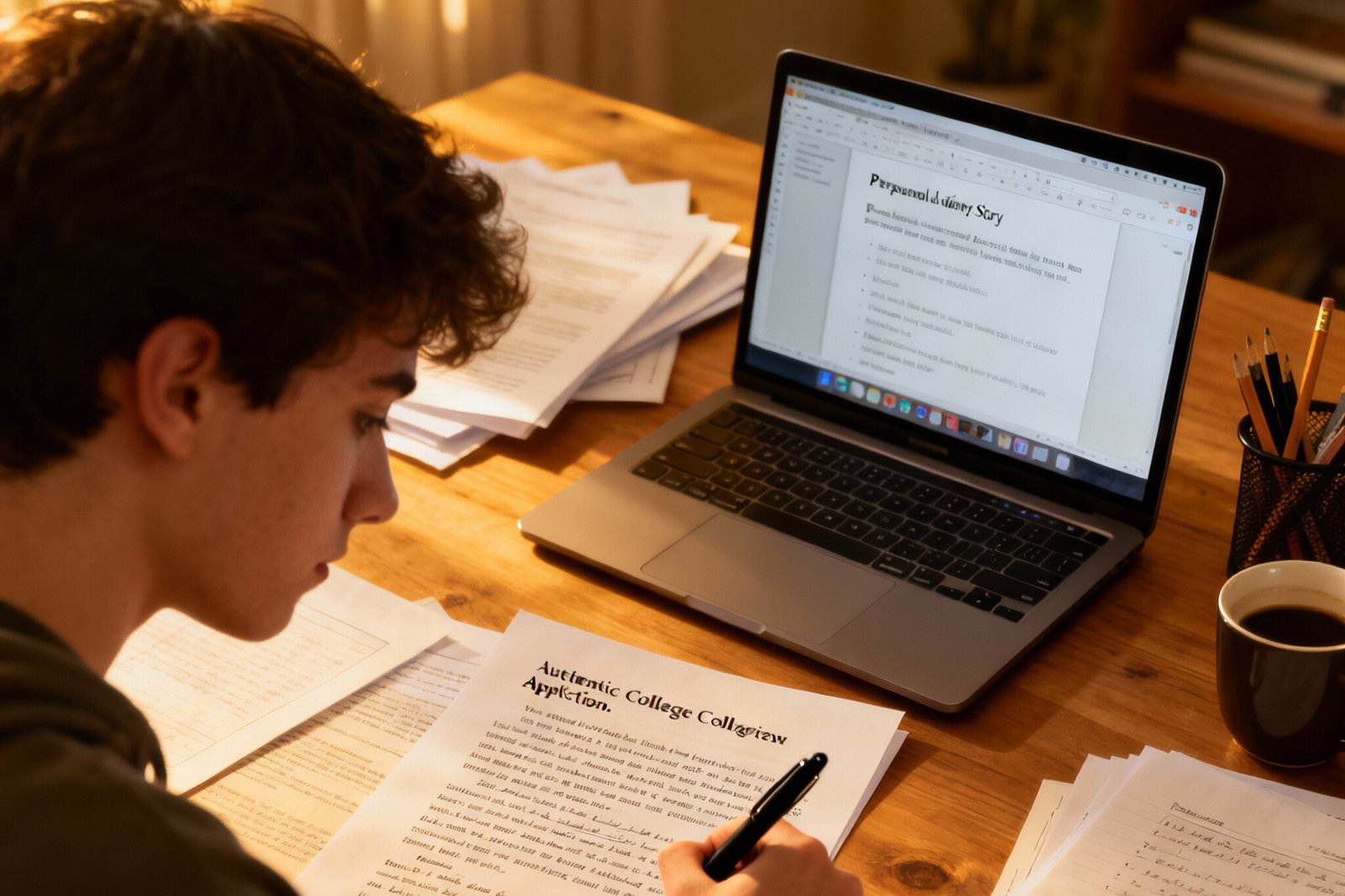As artificial intelligence tools become increasingly sophisticated and accessible, students across the globe are wondering: do college admissions check for AI in application essays and other materials? The answer isn’t as straightforward as you might expect. With AI detection technology evolving rapidly and colleges adapting their policies, understanding how universities handle AI-generated content has become crucial for prospective students navigating the admissions process.
The rise of AI writing tools like ChatGPT, Claude, and others has fundamentally changed how students approach college applications. While these tools offer impressive capabilities, their use in admissions materials raises important questions about authenticity, academic integrity, and fair evaluation. This comprehensive guide explores everything you need to know about AI detection in college admissions, helping you make informed decisions about your application strategy.
How College Admissions Officers Detect AI Content
Automated AI Detection Tools
Most universities have invested heavily in AI detection technology to screen application materials. The primary tools used by colleges include Turnitin, GPTZero, Copyleaks, and Originality.AI. These platforms analyze text patterns, sentence structures, and linguistic markers to identify potential AI-generated content.
By mid-2023, approximately 40% of colleges were actively using AI detection software, with another 35% considering implementation for the 2024-2025 application cycle. Universities spend substantial amounts on these technologies, ranging from $2,768 to $110,400 annually, with some institutions like Wright State University paying an additional $10,000 specifically for AI detection capabilities.
Manual Detection Methods
Beyond automated tools, admissions officers are trained to recognize AI-generated content through human assessment. They look for several telltale signs:
-
Inconsistent writing styles within the same essay
-
Generic or impersonal language that lacks authentic voice
-
Abrupt changes in tone or vocabulary level
-
Lack of specific personal details or experiences
-
Perfect grammar with minimal personality
-
Content that doesn’t align with other application components
Experienced admissions counselors can often identify AI-generated content by comparing essays with other application materials, looking for discrepancies in writing ability, voice consistency, and personal authenticity.
The Reality of AI Detection Accuracy
High False Positive Rates
Despite significant investments in AI detection technology, many universities are discovering serious accuracy issues. The false positive rate for AI detectors hovers around 4%, meaning human-written content is incorrectly flagged as AI-generated approximately one in every 25 submissions.
This accuracy problem has led several prestigious institutions to deactivate their AI detection systems. UC San Diego, UCLA, and Cal State LA all disabled AI detection for the 2024-2025 academic year due to concerns about wrongly penalizing students for authentic work.
The Deactivation Trend
The trend of universities deactivating AI detectors reflects growing awareness of the technology’s limitations. Many top-tier institutions are shifting away from automated detection toward more nuanced approaches that combine technology with human judgment.
What Happens When AI is Suspected
Verification Processes
When colleges suspect AI usage in application materials, they don’t automatically reject candidates. Instead, most institutions follow structured verification processes:
-
Human review by experienced admissions officers
-
Request for additional writing samples through secure, timed platforms
-
Verification interviews where students explain specific essay content
-
Draft submission requirements to show writing evolution
-
Cross-referencing with other application components
Interview-Based Verification
Many colleges now incorporate interview questions specifically designed to verify essay authenticity. Admissions officers might ask students to elaborate on specific points from their essays, explain their writing process, or discuss particular experiences mentioned in their applications.
Different Approaches by Institution Type
Elite Universities
Top-tier universities often employ more sophisticated detection methods, combining multiple AI detection tools with extensive human review processes. These institutions typically have larger admissions budgets and more resources dedicated to maintaining application integrity.
State Universities
Public universities often rely more heavily on automated detection due to volume constraints. However, many are reconsidering their approaches due to false positive concerns and budget limitations.
Community Colleges
Community colleges generally have less stringent AI detection processes, though this varies significantly by institution and region.
The Cost of AI Detection in Higher Education
Universities are making substantial financial commitments to AI detection technology. The investment ranges vary dramatically based on institutional size and detection tool sophistication:
-
Small colleges: $2,768-$15,000 annually
-
Medium universities: $15,000-$50,000 annually
-
Large institutions: $50,000-$110,400 annually
Some schools pay additional premiums for enhanced AI detection features, with Wright State University spending an extra $10,000 specifically for advanced AI detection capabilities.
Student Perspectives and Concerns
Anxiety About False Positives
Many students express concern about being wrongly accused of AI usage, particularly those with strong writing skills or unique writing styles that might trigger detection algorithms.
The Pressure to “Sound Human”
Some students report deliberately making their writing less polished to avoid AI detection, which could paradoxically harm their application quality.
Best Practices for Students
Authentic Writing Strategies
To avoid issues with AI detection while maintaining application quality:
-
Write in your genuine voice and avoid overly formal language
-
Include specific personal experiences and concrete details
-
Maintain consistency in tone and style throughout your essay
-
Keep drafts to demonstrate your writing process if requested
-
Have others review your work for authenticity feedback
What to Avoid
-
Using AI to write entire essays or significant portions
-
Copying AI-generated content without substantial modification
-
Creating content that contradicts other application materials
-
Writing in a voice that doesn’t match your demonstrated ability level
The Future of AI Detection in Admissions
Evolving Technology
AI detection technology continues improving, but so does AI generation capability. This technological arms race suggests that detection will remain imperfect for the foreseeable future.
Policy Development
Many universities are developing more nuanced AI policies that acknowledge the technology’s legitimate educational uses while maintaining application integrity standards.
Alternative Assessment Methods
Some institutions are exploring alternative assessment methods, including:
-
Video essays
-
Timed writing samples
-
Portfolio-based applications
-
Interview-heavy processes
International Perspectives
Different countries and educational systems approach AI detection with varying levels of concern and sophistication. While U.S. universities lead in detection technology adoption, international institutions are rapidly developing their own approaches to maintaining application authenticity.
Conclusion
Do college admissions check for AI? Yes, many do, but the landscape is complex and rapidly evolving. While approximately 75% of colleges either use or are considering AI detection tools, the technology’s limitations and high false positive rates are causing many institutions to rely more heavily on human judgment and verification processes rather than automated detection alone.
The key for students is understanding that authenticity remains paramount in college applications. Rather than trying to outsmart detection systems, focus on creating genuine, personal content that reflects your unique voice and experiences. As AI detection technology continues evolving, the most successful approach remains writing authentic essays that truly represent who you are as a person and student.
The college admissions process will continue adapting to new technologies, but the fundamental goal remains unchanged: identifying students who will succeed academically and contribute meaningfully to campus communities. By maintaining integrity in your application materials and focusing on authentic self-expression, you’ll navigate this evolving landscape successfully while presenting your best, most genuine self to admissions committees.
FAQs
Q1: Can colleges really detect if I used AI to write my essay?
A: Yes, many colleges use AI detection tools, but the technology has limitations with approximately 4% false positive rates. Colleges often combine automated detection with human review for more accurate assessment.
Q2: What happens if my essay is flagged as AI-generated?
A: Colleges typically don’t automatically reject applications flagged for AI use. Instead, they usually request additional writing samples, conduct verification interviews, or ask for essay drafts to verify authenticity.
Q3: Which AI detection tools do colleges use most commonly?
A: The most popular AI detection tools used by colleges include Turnitin, GPTZero, Copyleaks, and Originality.AI. Many institutions use multiple tools for more comprehensive screening.
Q4: Is it okay to use AI for brainstorming or outlining my essay?
A: Many colleges distinguish between using AI as a brainstorming tool versus using it to write actual content. However, policies vary by institution, so it’s best to check specific college guidelines or avoid AI assistance altogether.
Q5: How can I prove my essay is authentic if it’s wrongly flagged?
A: Keep drafts of your work, be prepared to discuss specific details from your essay in interviews, and maintain consistency with your demonstrated writing ability in other application materials.








Leave a Reply